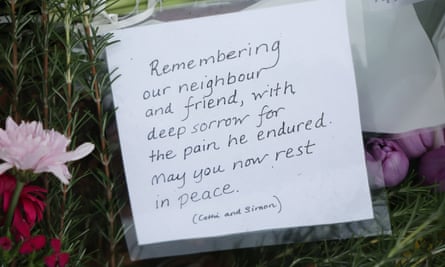There was a steady trickle of people making their way to the pavement just outside the gates of Portland Port. Some placed flowers and cards; others just stood for a few minutes and paid their respects.
The news that a man seeking asylum had apparently taken his life while housed on the Bibby Stockholm, the hulking barge berthed at the port, has shocked the people of this tucked-away corner of Dorset.
“It’s just terrible,” said Rocca Holly-Nambi, an arts organiser on Portland island. “We hoped this wouldn’t happen but we knew there was always the possibility it would. For me it’s confirmation of the scale of the inhumanity that this government is inflicting on vulnerable people. It’s intolerable.”
The arrival of the Bibby Stockholm in July led to unpleasant scenes with anti-racist campaigners clashing with a local group, No to the Barge, whose members claimed that the asylum seekers would lead to a spike in crime and antisocial behaviour.
But Holly-Nambi said in the months that followed the tight-knit community had been largely welcoming to the men. “Over the last few months there have been moments of hope with the community coming together to welcome these guys,” she said. Volunteers have put on classes and activities. “English classes, boxing and fitness sessions, community walks, music events. Friendships have been made. There’s been a beauty in it. But now we have this.”
Jim Draper, who used to work as a teacher on a prison ship, Weare, that was berthed at Portland for eight years until 2005, said there was deep sadness on the island. “There’s clearly a more intimidatory atmosphere there than we were led to believe by the Home Office,” he said. Draper said many of the Bibby residents attended churches on the island. “You bump into them around the place and hear pleasant stories about them.”
Office worker Jim Stevens had cycled over the causeway that separates Portland from the mainland to pay his respects. “I must admit, I was one of those who was worried that some of them might have caused mischief here. But I really don’t think that has happened. You see them going around the shops and they seem perfectly polite and nice. I wanted to come over to sort of say sorry for doubting them all.”
Lorraine Beckett, a member of the No to the Barge group, said the death was “very sad”. She conceded that the deep concerns that the residents could cause trouble in the community had not come to fruition. “You see the buses carrying them into town and see some of them hanging around Weymouth. But there doesn’t seem to have been the impact we were worried about. Still, the barge shouldn’t be here, simple as that.”

A couple turned up on a motorcycle and left flowers. Someone placed down a large sprig of rosemary, which can signify love and remembrance. Later a van driver, Tim Wright, stopped and took a photo of the tributes. “It’s one of those moments when politics doesn’t matter,” he said. “It’s a personal tragedy. I feel for his family, wherever they are.”
after newsletter promotion
“We are sorry that your life – so full of hope and promise ended here,” said one of the notes on the tributes. “Remembering our neighbour and friend with deep sorrow for the pain he endured,” said another. “Dear brother, we are so sorry to lose you,” said a third.
The mayor of Portland town council, Carralyn Parkes, summed up the grim mood: “It’s truly appalling and so terribly, terribly sad. The Bibby Stockholm is wholly unsuitable. It was designed for people to live on briefly while working – two or three weeks maximum. It wasn’t designed to be permanent accommodation. There are so many restrictions on how people come off and on with airport-like security. It’s cruel, inhumane, we’re better than this.
“There were a lot of scare stories when the barge arrived about the people who would live there. Nothing has materialised. But it’s not accommodation, it’s more akin to a prison. It has to be shut down.”

